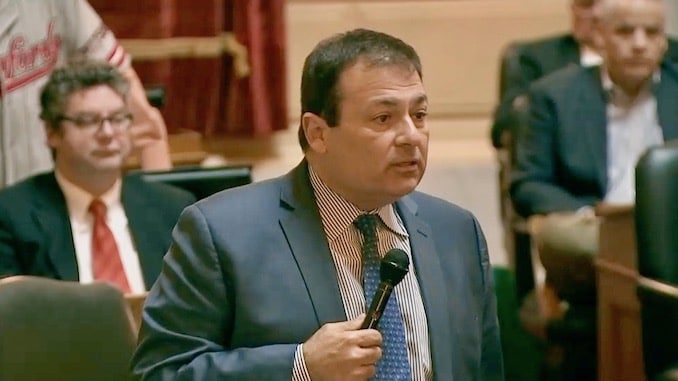Updated: Help low-income workers: Raise the EITC to fight the Trump tax law
On Wednesday, House Majority Leader Joseph Shekarchi (Democrat, District 23, Warwick) introduced legislation to help Rhode Island’s business owners pay less in federal taxes. The legislation counteracts a recent federal tax change included in the Tax Cuts and Jobs Act (TCJA) which limits the amount of state and local taxes (SALT) that can be deducted from one’s federal liability. Leader
March 2, 2019, 11:02 am
By Andy Boardman
On Wednesday, House Majority Leader Joseph Shekarchi (Democrat, District 23, Warwick) introduced legislation to help Rhode Island’s business owners pay less in federal taxes. The legislation counteracts a recent federal tax change included in the Tax Cuts and Jobs Act (TCJA) which limits the amount of state and local taxes (SALT) that can be deducted from one’s federal liability.
Leader Shekarchi’s legislation allows owners of pass-through corporations to report their personal income as business income, which is not subject to the SALT deduction cap. If the bill passes or is incorporated into the state budget, these business owners—most of whom likely received tax cuts on balance from the TCJA even with the SALT limit—will again be able to claim the full value of the federal deduction and thus face even lower federal tax liabilities. Because the bill only changes how income is reported, it is estimated to have no direct impact on state tax revenue.
While state lawmakers have leapt to respond to federal tax changes that affect high-income Rhode Islanders, one important change impacting low-income residents has been left unaddressed.
Buried in the TCJA was a subtle but alarming modification to the country’s largest anti-poverty program, the earned income tax credit (EITC). Instead of expanding the EITC, which benefits low-income workers, President Trump and congressional Republicans changed the law to erode its value over time. Rhode Island’s EITC is set equal to a percentage of the federal EITC, so it too is being curtailed. To offset the EITC erosion that has already begun to impact low-income workers, Rhode Island lawmakers should commit to incrementally raising the credit every year.
Incremental EITC increases would bring the state back in line with its pre-TCJA commitment to low-income workers; in this way, the increases would be budget-neutral. Further increases to the EITC, while not completely self-financing, would be smart investments. Because it is structured to incentivize employment, the EITC is incredibly cost-effective and nearly pays for itself. According to one recent study, the EITC only costs 13 percent of its “sticker price.” In other words, 87 percent of the fiscal cost of the EITC is offset by increases in sales and payroll tax revenue and reductions in spending on other public assistance programs. (Caveat: the study looks at the federal EITC; the return on state EITCs is likely not quite as high as 87 percent). An EITC expansion would have a meaningful impact on low-income workers and a negligible effect on the state budget.
As state lawmakers introduce legislation responding to the TCJA, they should not forget about low-income Rhode Islanders. By raising the EITC, lawmakers can counteract one of the most pernicious parts of the Trump tax law.
3/2/2019: This piece has been revised to reflect the budget-neutrality of an EITC expansion.






